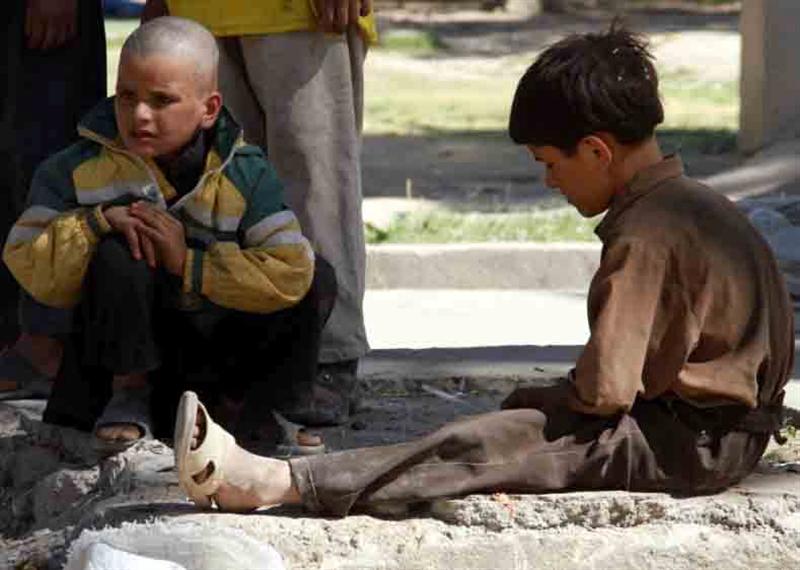TALOQAN (Pajhwok): With authorities lacking funds to support impoverished children, the number of beggars and labourers is on the increase in the capital of northern Takhar province.
Dozens of shoeshine boys could be seen in front of restaurants, mosques and recreational parks of Taloqan. There are others who sell plastic goods and do hard labour instead of going to school.
One of them, Roohullah, a nine-year-old who polishes boots and shoes in front of a park, said his father was addicted to drugs and he had to help his mother meet family needs.
His face and eyes reflected a hard life, as the boy said they had been unaware of his father’s whereabouts for the last few months and his mother worked at people’s homes to eke out a living.
“Why not, I love going to school like all other children. Education is really nice, but I can’t afford quitting work to go to school.” Roohullah daily leaves home at 8am and returns in the evening. His average income is about 100 afghanis.
Ahmadullah, who is one year Roohullah senior, is part of a large group of children who beg on streets and roads from dawn to dusk. He was seven-year-old when he started begging.
He said he was the sole breadwinner in his family and had previously worked as shoeshine boy but that occupation was less profitable than begging.
The 10-year-old said no one offered him job because of his age and if the government assisted his family, his dream to go to school could come true.
Taloqan residents say they are concerned about the future of these vulnerable children, who could easily be abused by criminal gangs. They say these children often fell into the hands of terrorists who used them for different tasks.
Resident Najmuddin said street children were often subjected to sexual harassment by adult street boys. “As you understand ours is a backward society, sexual exploitation and abuse is common. These children can’t defend themselves from being abused and are subjected to cruel acts. Such incidents have increased.”
Meanwhile, officials of the provincial labour, social affairs, martyrs and disabled department said they had been so far without a programme to assist poor children.
Nooruddin Qarizada, the department’s acting head, said they did not know the exact number of child beggars and labourers. He said they had provided shelter to 145 vulnerable children at a training centre after collecting them from various parts of the city.
He said they lacked funds to assist all street children and confirmed the number of such children was increasing with each passing day. This Afghan year, Qarizada said ACTED (the Agency for Technical Cooperation and Development), a Paris-based non-governmental organisation founded in 1993, had assisted families of poor children with essential goods.
He denied receiving any report about sexual harassment of children, but said everything could happen to them because of their vulnerability, urging religious scholars to create awareness through their sermons about children’s rights.
Mufti Habibur Rahman, who is responsible for management of mosques at the provincial Hajj and Auqaf Department, promised he would task prayer leaders with preaching children’s rights.
“Islam prohibits subjecting children to injustices and every Muslim is duty-bound to prevent such practices,” he said, adding first families should be held responsible for sending their children into hard labour and then those hiring their services and meting out injustices to them.
Afghanistan ratified the Convention on the Rights of the Child (CRC) in 1994, but yet to formalise it through national legislature as the government’s attention has been undermined by the lack of protective mechanisms for children’s rights, coupled with traditional customs, political instability and lack of security throughout the country.
The new government, led by President Ashraf Ghani and Chief Executive Officer Abdullah Abdullah, has promised bringing improvement to the lives of impoverished children, but so far no practical steps have been taken in this regard.
Takhar is not the only province where child beggars and labourers exist. The issue is graver in the central capital Kabul as compared to provinces.
In his recent speech to the Wolesi Jirga, President Ghani said currently 1.7 million children did not go to school in Afghanistan and urged overseas Afghans to support Afghan kids to go to school instead of work places.
ma/mud
Visits: 2









GET IN TOUCH
NEWSLETTER
SUGGEST A STORY
PAJHWOK MOBILE APP